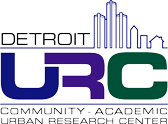Promoting Healthy Eating in Detroit
| Funding Source | CDC $1.5 million; 9/02-9/05 Michigan Dept. of Community Health &60,000 (one year pilot program – 2002-03) |
| Goals & Objectives: | To develop and sustain support community environments and policies aimed at increasing access to, and use of, healthy foods by residents of eastside and southwest Detroit. |
| Communities Involved: |
African-American and Hispanic residents of eastside and southwest Detroit. |
| Partners: | Associated Food Dealers of Michigan, CHASS and its REACH Detroit Partnership, the Detroit Department of Health and Wellness, CHASS, Detroit Hispanic Development Corporation, Friends of Parkside, Gleaners, Promotion and its Nutrition Division & Village Health Worker Partnership, Gleaners Community Food Bank of Southeast Michigan and its Operation Frontline, Michigan Food and Beverage Association, Southeast Michigan Diabetes Outreach Network, Southwest Solutions, University of Michigan Schools of Public Health and Social Work, Vistas Nuevas Head Start. |
| Intervention: | Expand neighborhood mini-markets; increase stores/restaurants with healthy foods; develop markets; conduct healthy food demonstrations; establish healthy eating support groups and health food tip sheets and meeting policies; educational materials. |
| Outcome Indicators: | Formation of sustained collaboration among partners interested in promoting healthy eating in Detroit; Increased number of locations offering health food choices including fresh produce mini-markets, community organization meetings, stores and restaurants, farmers markets; and Increased opportunities for residents to learn about, and taste healthy foods evidenced by healthy food demonstrations with tastes, and tip sheets, recipe cards, healthy food policy brochure for meetings and other materials disseminated to the public. |
| Methods & Analyses: | Process and outcome evaluation used project meeting and activity documentation, participant observation, key informant interviews with members of the steering committee, staff, community residents using services. Qualitative analyses of content themes and quantitative analysis of numbers and locations of activities, e.g. number and location of mini-markets and food demonstrations, number of pounds of produce sold, number of materials disseminated, recipients of materials. |
| Results: | The partners developed and maintained sustained collaborations with organizations committed to increasing the supply of, access to, and demand for healthy food in Detroit. We demonstrated how fresh produce mini-markets using wholesale produce could be developed and conducted by community resident staff with positive customer satisfaction; host-site sustainability without grant support was not achieved but models and materials developed have helped several organizations develop their own successful models, including church-based volunteer markets and a sustained farmers market at a PHED partner organization that has increased access to and supply of Project Fresh coupons redeemed for produce by Latina WIC recipients in southwest Detroit. Community resident staff developed skills in conducting healthy food demonstrations and several received ServSafe food handler certification following training. Food demonstrations were conducted, with some sustainability (demand for demonstrations by community organizations willing to pay trained advocates. Healthy food policy guide was developed and implemented in community organizations. Culturally targeted, English and Spanish language nutrition materials in paper copy, electronic and web-based media were developed, used in PHED and other Detroit activities and disseminated widely in Detroit, Michigan and nationally. These include a newsletter series, 13 healthy eating tip sheets, a wide variety of recipes on cards and (being finalized) How-to Manuals for mini-markets, food demonstrations and other project activities. |



